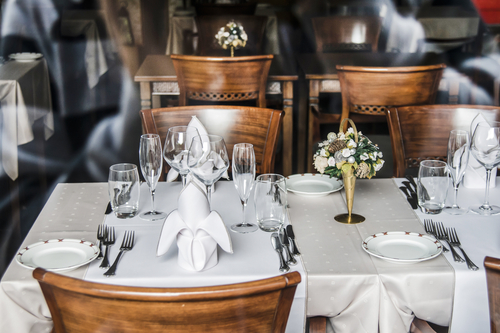The Evolving Customers’ Evaluations of Hospitality Services across COVID-19
The Evolving Customers’ Evaluations of Hospitality Services across COVID-19
Feng Hu, Thorsten Teichert, Shengli Deng, Yong Liu, Guotao Zhou
Do you have a novel travel plan next month? It may be within a context that is very different from the past. Anxiety about safety may cause you to think twice about social distance in travel; camping is taking the place of a luxury cruise ship in your mind; the upcoming journey will look different from before the pandemic. It is acknowledged that travel behavior changes after COVID-19 outbreak. However, little is known about how pandemics alter travelers’ evaluations of hospitality services. Hospitality practice needs directions in organizing its priorities during acute pandemic situations and adjusting to possibly longer-lasting shifts in consumer preferences.
—Anxiety about safety may cause you to think twice about social distance in travel—
Our study investigates the changes in travelers’ expectations and perceptions of hotel services during different stages of the novel coronavirus 2019 (COVID-19) pandemic. 98,163 Chinese hotel reviews were collected from Ctrip.com and scrutinized via text mining and sentiment analysis techniques to derive new implications for service optimization.
How has the COVID-19 pandemic impacted the occupancy of the investigated hotels in Shanghai?
The comparison of hotel occupancy between 2020 (black line) and 2019 (gray line) confirms that the Chinese hospitality industry began to be sharply influenced by COVID-19 after this first-time node. (The Chinese government released its first announcement about COVID-19 on January 21, 2020), and then began to recover from the COVID-19 pandemic after node Number 5. (On April 14, 2020, the Chinese government released its announcement concerning the control of COVID-19 and the planned safe and orderly opening of tourist attractions).
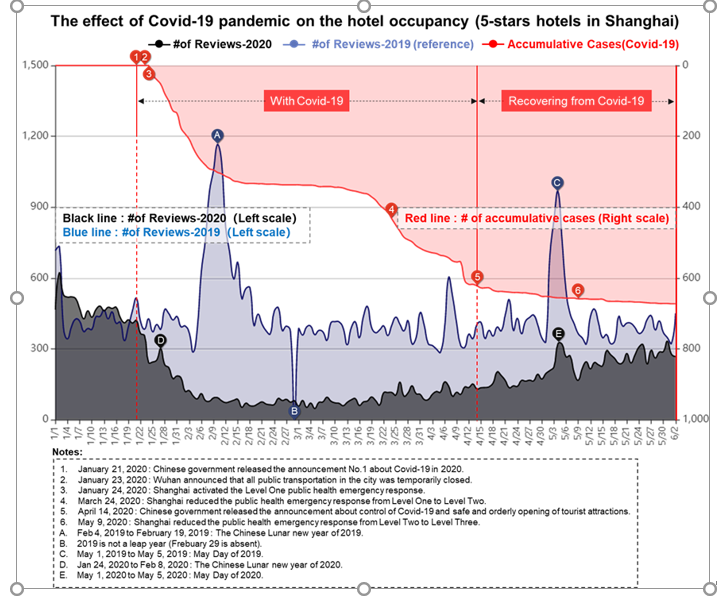
Note: The hotel reviews used in this study were collected on June 3, 2020 from Ctrip.com.
What shifts in the importance travelers place on hotel services, across the COVID-19 pandemic?
A few hotel attributes (e.g., breakfast, location and surroundings) lost importance in both pandemic periods (within and recovering periods). Consumers’ deteriorated interest in these attributes hints towards limited experiential opportunities in the pandemics, e.g. for crowding or exposing outside hotels. Conversely, some attributes (e.g., experience, cleanliness, service, and front-desk) gained importance in the pandemic phases because of increasing demand of inside experiences and security/hygiene. Transportation issues (e.g., transport and airport) became less important in the later Recovering period, indicating a shift away from public transportation means. Unexpectedly, core hotel attributes, especially bed comfort, as well as price considerations continually decreased in importance during the pandemic, while room attributes were only in the rigorous period of pandemic (Within) of less concern.
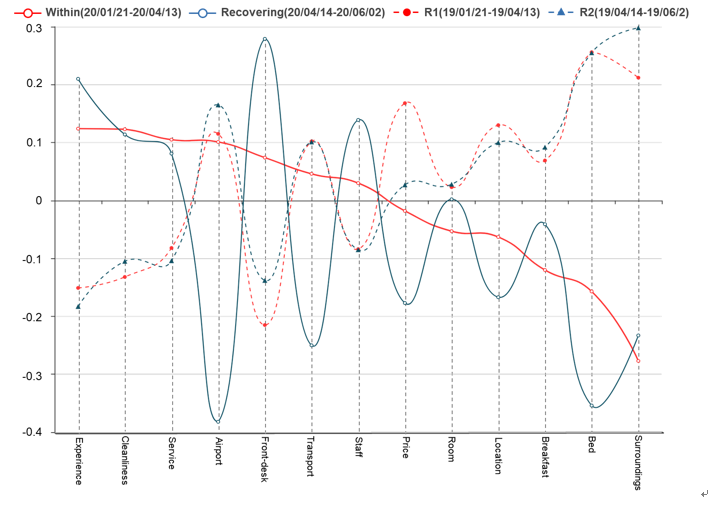
What changes in customers’ perceptions of service performance, across the COVID-19 pandemic?
Higher performance assessments in both COVID-19 periods (within and recovering periods) may indicate that travelers exhibited a greater level of forgiveness on some attributes (e.g., surroundings) during the pandemic, while other attributes (e.g., cleanliness and front-desk) may have been significantly improved in the pandemics by hotel management. Attributes (e.g., breakfast, experience and decor) exhibiting a declining performance in the recovering phase indicate that hotels were initially unable to fulfill customers’ expectations regarding these attributes. However, their performance assessments increased along with the eliminating of pandemic. Only facility was rated more negatively in both pandemic phases, since the implementation of hotel facilities were mostly outside the control of the hotels’ management.
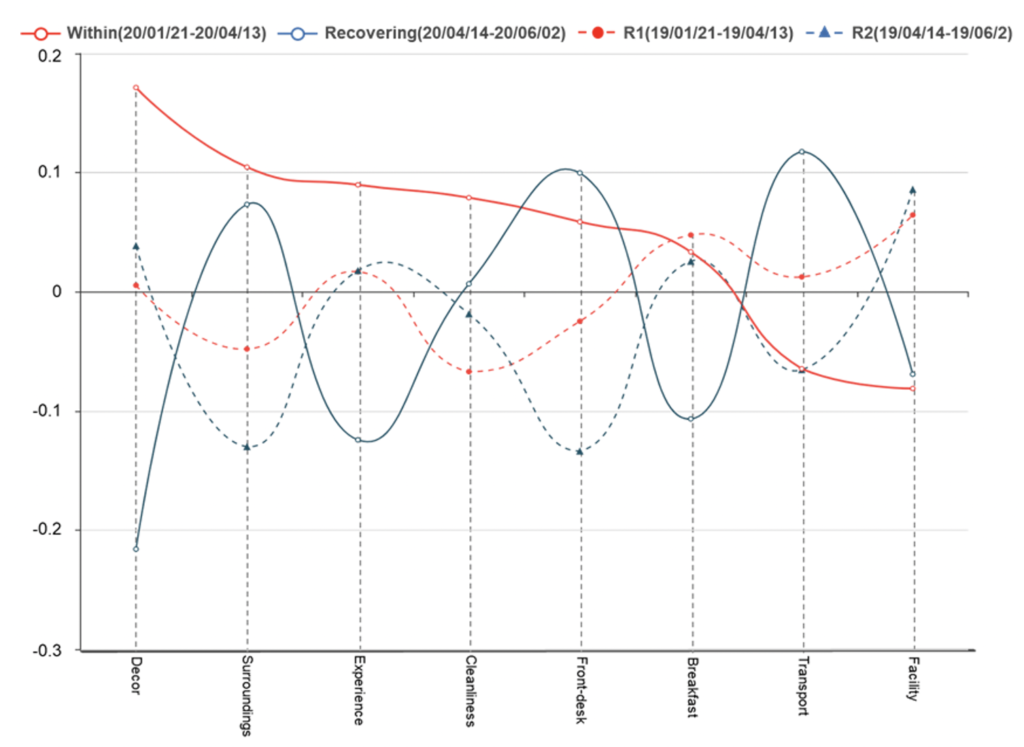
What insights can be derived from these changes to direct hospitality practices during the COVID-19 pandemic?
While each dimension (importance or performance) of travelers’ assessments provides useful insights for optimizing hotel offerings, a full picture is found by jointly considering relative changes. This can help guide hospitality practice to prioritize its measures in acute pandemic situations (Within) and to adjust to possibly longer-lasting shifts (Recovering) in consumer preferences. For instance, the effects of cocooning can be observed consistently in travelers, who are necessarily outside of their own home but, nonetheless, are searching for a safe haven (e.g., cleanliness). These shifts extend to more quality-related hotel attributes, such as experience and front-desk support; however, these changes did not occur immediately in the acute Within period of the COVID-19 pandemic. Instead, major changes in these areas were only observed in the Recovering phase. This suggests the possibility of some longer-lasting shifts in customer expectations.
Specifically, service-related attributes—such as staff and experience—were measured as being “good work” during the acute Within period of the COVID-19 pandemic, but they experienced a shift toward increased importance and decreased performance evaluations in the Recovering stage. Hoteliers, therefore, should enhance relevant offerings to match dynamic customer requirements. Some core supplies, like breakfast and room, also showed a similar shift; however, they only showed a potential transformation from “Crisis Losers” to “Critical Factors,” indicating that the requirements on some core offerings are recovering as the pandemic eased, and hoteliers may increasingly improve core supplies over time. Exterior attributes—including surroundings, and location, transport—exhibited no significant effects according to time series, up to the date of data collection. Thus, exterior attributes are still considered “Unneeded Luxury.”
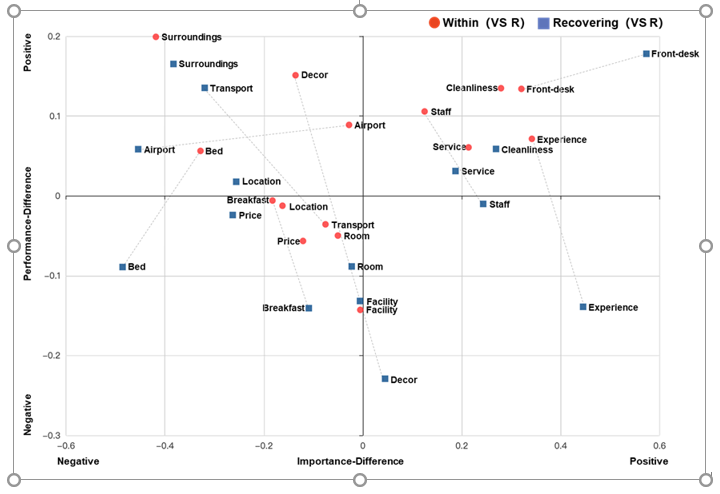
This study is among the first to investigate the impact of COVID-19 by dividing the pandemic into two stages: Within and Recovering. Such granular analyses offer deeper insights into the evolution of travelers’ evaluations on service attributes as a pandemic evolves. Furthermore, our study contributes to tourism literature by introducing cocooning theory to explain how travelers’ expectations can be altered as a result of cocooning themselves against potential dangers during pandemics. We found that travelers alter their expectations on hotel service by highlighting the requirements related to social distance and hygiene in the stage of pandemics. This study also reveals shifts in consumers’ evaluations well beyond hygienic requirements. Insights obtained from this research can help guide hospitality practice in organizing its priorities during acute pandemic situations and adjusting to possibly longer-lasting shifts in consumer preferences.
The original article: Feng Hu, Thorsten Teichert, Shengli Deng, Yong Liu, Guotao Zhou, (2021). Dealing with Pandemics: A Longitudinal Investigation of the Effects of COVID-19 on Customers’ Evaluations of Hospitality Services, Tourism Management, Volume 85, 104320, https://doi.org/10.1016/j.tourman.2021.104320
Cite this article in APA as: Deng, S., Hu, F., Liu, Y., Teichert, T. & Zhou, G. (2022, June 2). The evolving customers’ evaluations of hospitality services across COVID-19. Information Matters, Vol. 2, Issue 6. https://informationmatters.org/2022/06/the-evolving-customers-evaluations-of-hospitality-services-across-covid-19/




